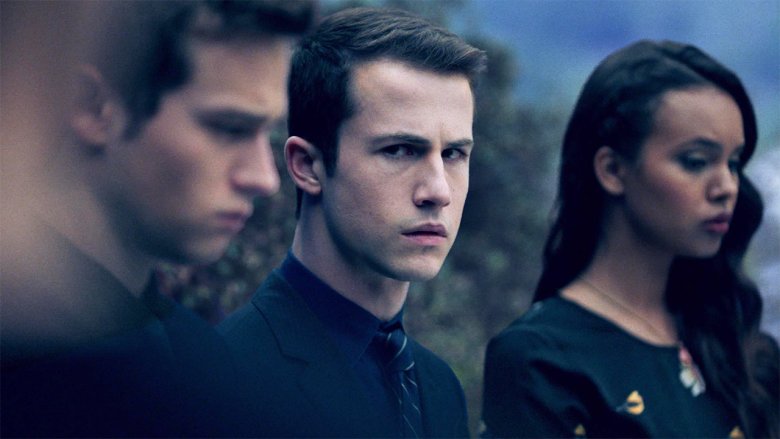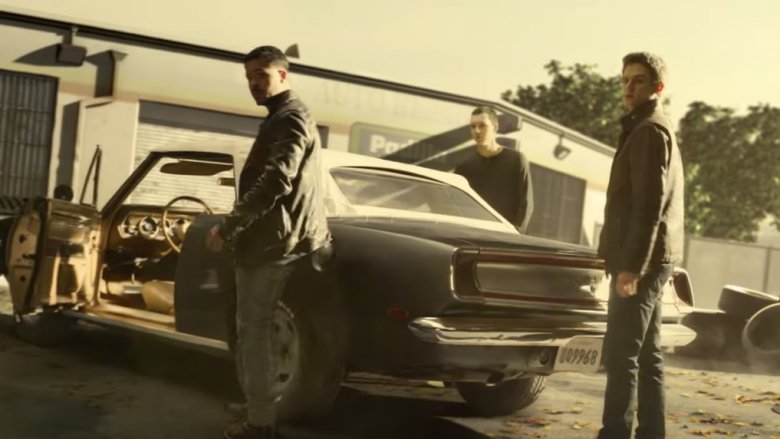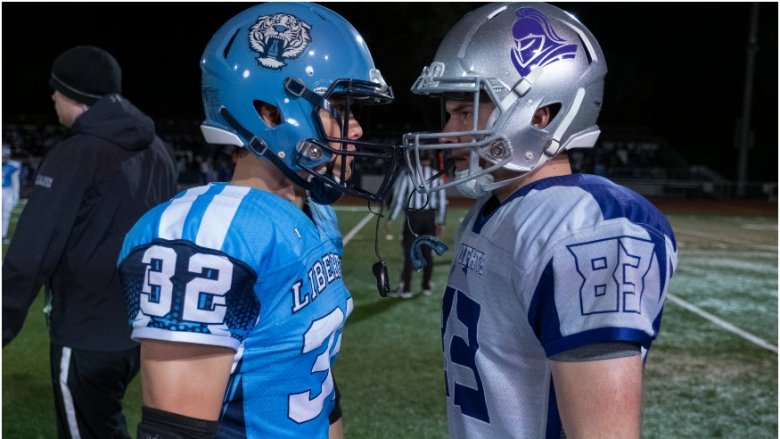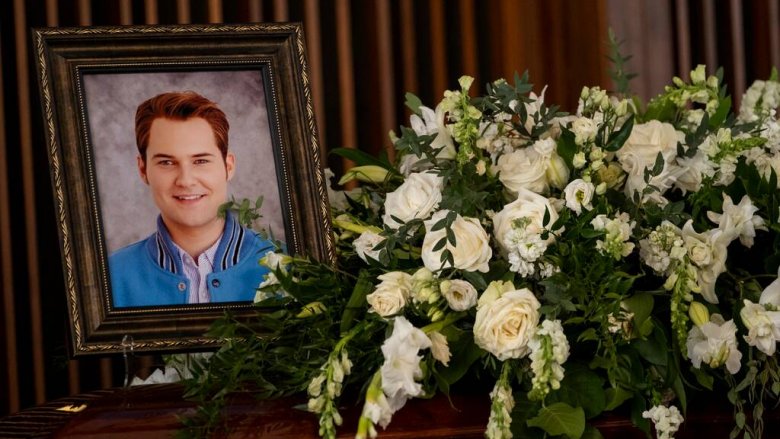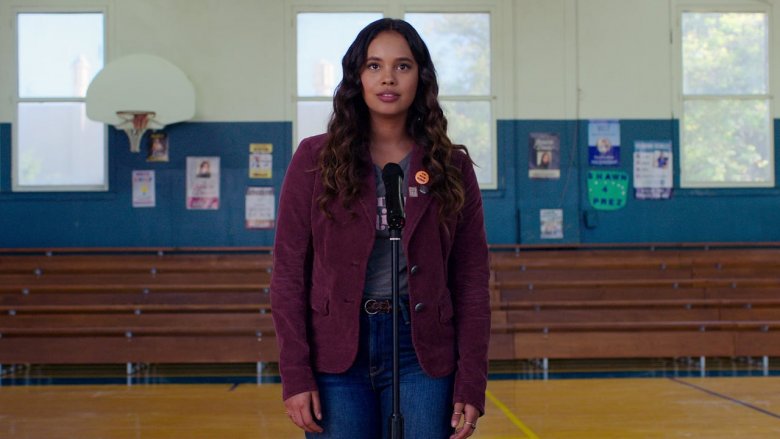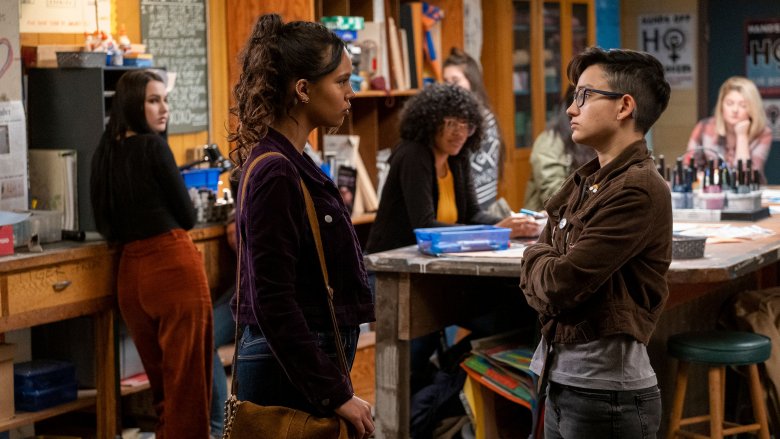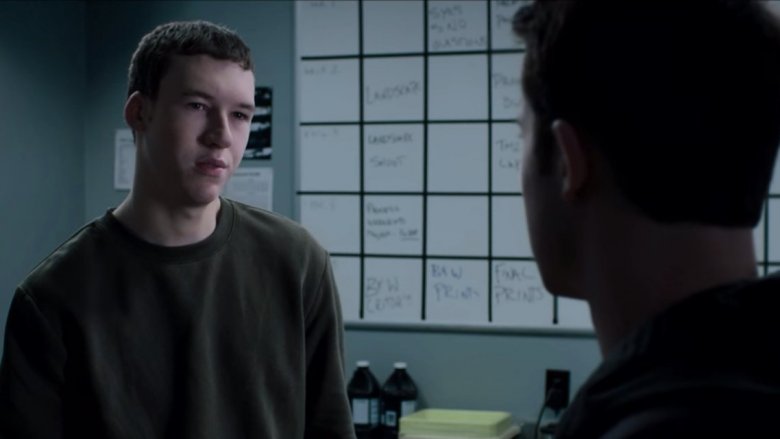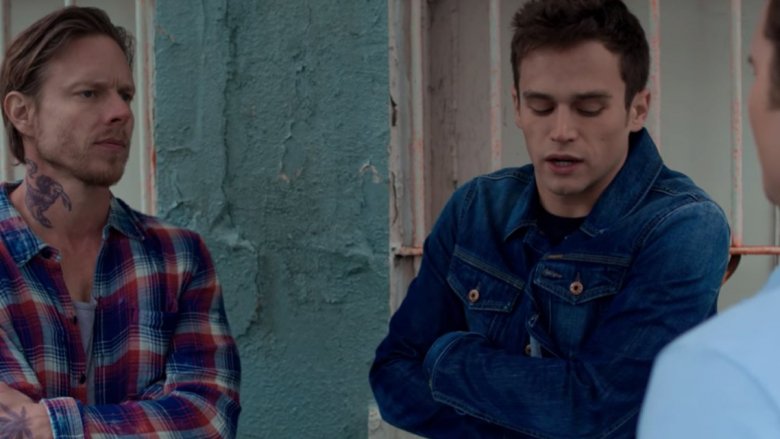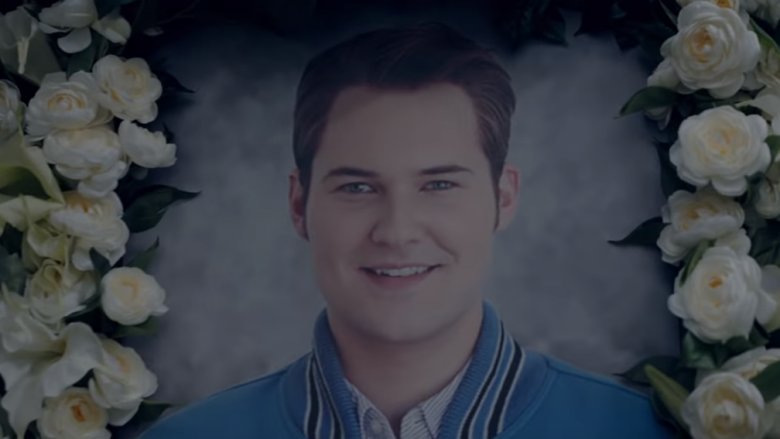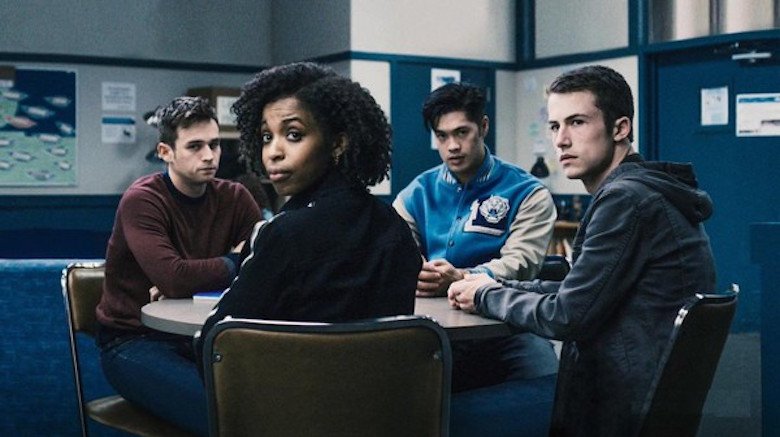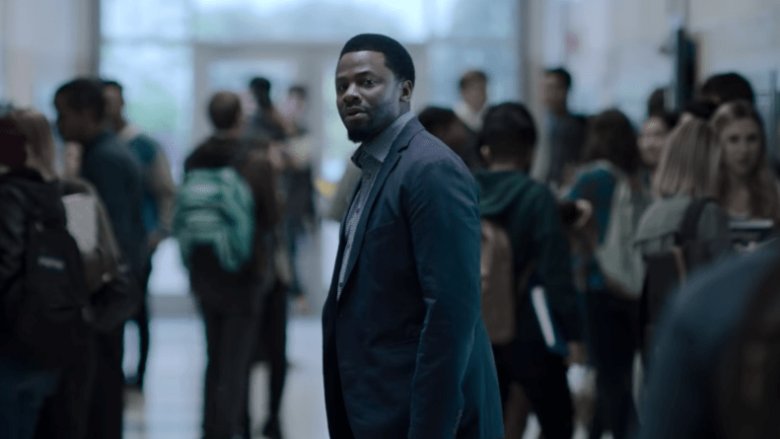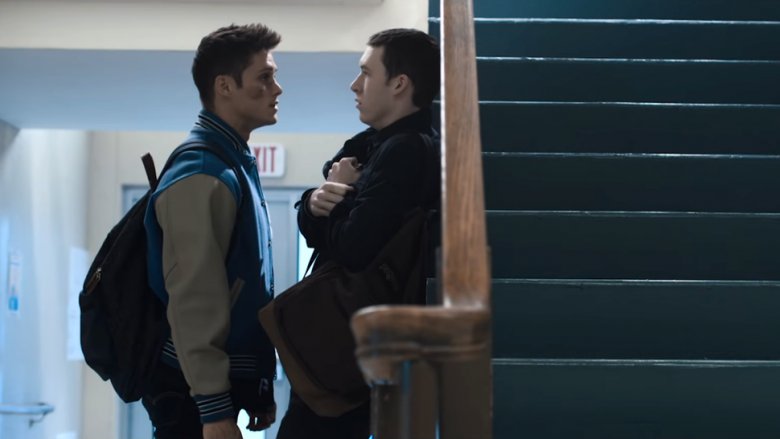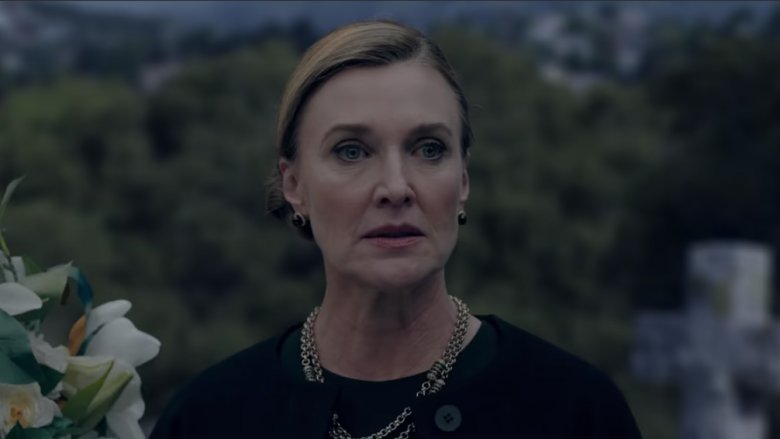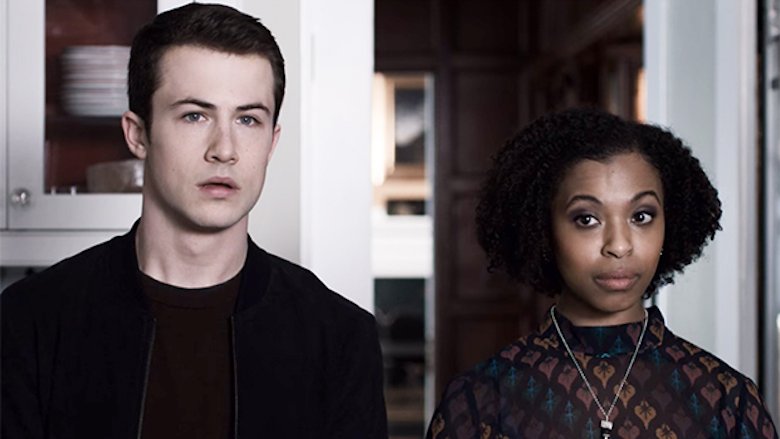13 Reasons Why Season 3 Ending Explained
Netflix's controversial hit drama 13 Reasons Why took a different approach to its third season. While it still used the narrative trick of flipping between the past and present, the focus shifted from suicide to survival — and all the complications that can come with that.
In season three, there's a new girl at Liberty High, Ani Achola (Grace Saif), whose mother Josephine Amara (Nana Mensah) is a home care worker for Nora Walker's (Brenda Strong) ailing father. Serial rapist Bryce Walker (Justin Prentice), fresh off his acquittal for crimes everyone knew he committed, lives with his mother Nora after his father Barry (Jake Weber) moves in with his new girlfriend. Like Hannah Baker (Katherine Langford) before her, Ani is an unreliable narrator who is drawn to perpetual good guy Clay Jensen (Dylan Minnette) as well as his troubled group of friends. Ani is positioned as a simultaneous insider and outsider as the new girl, who uses her keen sense of perception to help Clay and his friends process a number of different traumas as well as figure out who killed Liberty High's most hated guy, Bryce Walker.
It's a lot to unpack and untangle, but we're here to help. Here's the ending of 13 Reasons Why's third season explained.
What happens after the Spring Fling in 13 Reasons Why?
Season two of 13 Reasons Why culminates in Montgomery "Monty" de la Cruz (Timothy Grenaderos) and his friends brutally raping Tyler Downs (Devin Druid) in the boys' bathroom at school. Tyler is so physically and psychologically broken by the assault that he plans a school shooting to take revenge on the boys who hurt him, as well as other classmates who had bullied him. Clay stands in the line of fire and calms Tyler until Tony Padilla (Christian Navarro) shows up in a getaway car. In season three, we find out Tony disarmed Tyler and dumped the guns and suicide vest into the river. Tyler left behind a flash drive recounting what Monty did to him, as well as telling his parents he loved them.
The police continue to believe that the call about the shooting was a hoax, but Clay and his friends remain on edge nine months later. Season three also reveals that Bryce saw the confrontation between Tyler and Clay, as well as Tony. For the nine months after Tyler's attempted shooting, Clay organizes his friends to actively support Tyler as he heals. During most of that time, almost no one knows about the assault; it's assumed that Tyler's motives were simply retribution for being bullied.
13 Reasons Why and 1 terrible homecoming game
Bryce Walker leaves Liberty High and transfers to rival all-boy private school Hillcrest, where his reputation as a rapist follows him. As hated in his new school as he was in his old one, Bryce causes new destruction when one of his victims, Jessica (Alisha Boe), learns that he's not only being allowed to return to Liberty to play football as a member of the Hillcrest team during the homecoming game, but that his mother wanted to re-enroll him there. Jess is now student body president, having run on a platform targeting jock culture, and she organizes a protest with her new survivor support group Hands Off Our Bodies. A group of women, led by Jess, disrupts the homecoming game by stripping and revealing blood-colored handprints on their bare flesh. When a Hillcrest player grabs Jess, she hits and kicks him, which sets off a chain of violence in retaliation.
Meanwhile, Bryce learns that his ex-girlfriend Chloe (Anne Winters) — who he also raped, and who lied in for him in season two of 13 Reasons Why — was not only pregnant with his baby, she had an abortion without telling him. Because Bryce's ex-teammate Zach (Ross Butler) helped her, Bryce uses the fight as an excuse to rush Zach and snap his knee, effectively destroying Zach's future in sports.
13 Reasons Why season 3 and the mystery of who killed Bryce Walker
After the homecoming fracas, Bryce Walker disappears — and then his body shows up floating in the river. Police initially think he was shot; then they announce he was beaten to death. Finally, they reveal his death was by drowning.
Every single character is lying about where they were after homecoming — for many different reasons — on the night Bryce was killed, and almost every one of them has at least one good reason to kill him. 13 Reasons Why explores each person and each reason in depth. But because of Mrs. Walker, the police wrongly focus on Clay, who almost goes to jail. So who actually killed Bryce?
We find out that Zach follows him out to the pier and beats him badly in retaliation for busting his knee and destroying his future. Zach leaves him wounded and phoneless, and eventually confesses his role to the police in order to help Clay. But it's actually Alex (Miles Heizer) who throws Bryce into the river in retaliation for Bryce's verbal abuse of Jess. Ani helps create a narrative to pin the blame on Monty, who's already died in jail while awaiting his hearing for raping Tyler. Alex's dad, Deputy Standall (Mark Pellegrino), helps cover up Alex's involvement.
In a creepy nod to Hannah Baker, Bryce leaves behind a confession cassette tape including an apology — and admitting to raping at least nine women, some of them multiple times.
13 Reasons Why season 3's depictions of healing from sexual assault
Season three of 13 Reasons Why is dominated by survivors, and has a particular focus on those who've survived sexual assault. Jessica no longer has to go to school with the guy who raped her, but she's still struggling. She realizes one way to reclaim herself is by becoming an advocate for other survivors, and she becomes an activist to end rape culture on campus. She uses her story to empower others to share theirs and begin healing. From her activism she is also finally able to reclaim her own body and sexuality, and in the process realizes that she still has feelings for her ex Justin (Brandon Flynn), in spite of the fact it was his best friend who raped her.
Tyler Downs is not so lucky. He has to see the person who assaulted him every day. Worse, Monty openly taunts him and even threatens to rape him again. Tyler is so traumatized he won't use the bathrooms in school. Alex encourages him to take boxing lessons at Caleb's (RJ Brown) gym, which is his first step to self-reclamation — but not before considering suicide again and also threatening to kill Bryce, since Monty told him Bryce was the one who orchestrated the rape. Tyler finally tells Clay what happened, which ultimately opens Tyler's life to the path of healing. He ends up using photography and art as therapy he can share with others.
How 13 Reasons Why season 3 addresses the roots of rape culture at school
13 Reasons Why's third season does an excellent job of not only exploring the personal effects of sexual violence, but also the deep systemic roots of this social problem. When Zach becomes captain of the football team he decides to clean up the players, closing the "Clubhouse" on campus where jocks sexually assaulted girls. He also institutes mandatory drug testing. Zach finally understands the dangerous kind of entitlement that comes with giving athletes free passes for bad behavior, and wants to do his part to stop it.
Jessica's survivor support group becomes a powerful force of change at Liberty High and beyond. After their protest at homecoming, Jessica is asked to apologize to her school as well as Hillcrest in a joint assembly; instead, she once again tells her story and names the rapist. She inspires other students in the audience to identify as survivors as well. Tyler stands up, which encourages several other men to do the same. Jessica's boyfriend Justin stands, revealing a part of his past she hadn't even been aware of. Including male rape survivors in the narrative is arguably one of the most useful things that 13 Reasons Why has accomplished in its problematic tenure. This breaks a huge taboo for male survivors and hopefully helps real-life survivors feel safer coming forward.
How 13 Reasons Why season 3 depicts surviving suicide
Alex is still physically struggling after his suicide attempt in season one. By the end of season three, Alex is considering it again once more because of his guilt surrounding Bryce's murder. By the end, we get the sense that Alex finally understands that suicide is not the answer — neither attempting it nor even considering it as a solution to his problems.
During the course of season three, Tyler attempts suicide two more times — first with a gun, then by almost jumping off a bridge. On his second attempt, Tyler sees Bryce's dead body in the water and in that moment decides decides he wants to live. While it's certainly morbid that Tyler takes photos of Bryce's dead body floating in the water, Tyler actually uses those photos to stop himself from thinking about attempting suicide again. Bryce was a terrible person who destroyed dozens of lives in his short time on Earth. But in his death, he arguably ended up saving Tyler's life once and for all.
13 Reasons Why season 3's depiction of drug abuse
As in previous seasons, drug and other substance abuse is a dangerous current that runs through the third season of 13 Reasons Why. After Jessica breaks up with him, Alex begins taking steroids so he can bulk up and get stronger faster. But of course, steroids come with side effects — and for Alex, one of those is bouts of rage along with a series of unconsidered risks that endanger his life.
We also meet Monty's father, who is a violent alcoholic, potentially explaining some of Monty's sociopathic behavior at school. But the most tragic is Justin's relapse with heroin after his drug dealer Seth (Matthew Alan) returns to town and presses Justin for the money he's owed. Justin begins dealing out of his workplace, and after an altercation, he gets arrested and can't call his adopted parents the Jensens (Amy Hargreaves and Josh Hamilton). Bryce bails him out and pays off his debt, bringing him a bottle of oxycodone to help him get clean. After Bryce's death, Justin is so overwhelmed with grief and his complicated feelings toward Bryce that he has another relapse. Justin grew up with an addict mom who often neglected him until Justin met Bryce when they were eight. Until the Jensens, Bryce was Justin's only family. By the end of season three, Justin comes clean to his adopted family and admits he needs proper help.
13 Reasons Why season 3's attempts to humanize men who commit sexual violence
Where 13 Reasons Why stumbles in its third season is in its attempts to rehabilitate the images of sexual predators. Bryce has a convincing good guy act he only extends to some. He protects his mom, and after Bryce finds out his father got Tony's family deported to Mexico, Bryce buys Tony's red Mustang for double the asking price and even gives the car back once they learn that Tony's family can't return to America. Bryce finally listens to Hannah's tape and seems to be changed by it. But by the end of season three, we watch Bryce bully Clay and slut-shame Ani, smash Zach's knee, and rage at Jessica when she won't forgive him. "The world won't let me change!" he screams, once again shirking responsibility for his actions.
With Monty, 13 Reasons Why shows us his conflicted feelings about his repressed sexuality as well as his terrible family life. Monty is so homophobic he can't even admit he loves his football family like brothers. "He was a human being," Monty's hook-up Winston Williams (Deaken Bluman) says to Ani after his death, a statement that many also say about rapist Bryce after his death.
But people who destroy lives through sexual assault failed to honor the humanity or bodily autonomy of the people they hurt. By committing these acts, they arguably forfeit their own humanity in the process, whether dead or alive. It's easy to understand why 13 Reasons Why's writers tried to present a more nuanced picture, but these elements of season three may be difficult for some viewers to accept.
13 Reasons Why season 3's complex portrayal of family
Through shared trauma — and shared secrets — the surviving characters in 13 Reasons Why's third season all come together by the end into a different kind of family unit. Justin is living with the Jensens and comes clean about his drug relapse. Alex and Jess are bonded by their roles in Bryce's murder and the cover-up, as well as their platonic love. Tony is building a new home with Caleb and thanks to social media can still video chat and be in touch with his family in Mexico even if they can't return to America.
When Clay is accused of Bryce's murder, with so much circumstantial evidence lining up to put him in jail, all the teens band together to save him. Yes, they're all bound by a web of secrets and lies they will have to maintain for the rest of their lives. So is this a family of mutually assured destruction? Maybe for some. But for others, it's an opportunity to build relationships based on complete trust.
13 Reasons Why season 3's depiction of trauma's aftermath
At its heart, 13 Reasons Why is a show about trauma and how people process it differently. For Hannah Baker, who does not appear in season three but whose shadow looms darkly, suicide was her response to trauma. Hannah's mom Olivia (Kate Walsh), moves to New York to live the life Hannah planned in the city. Hannah's dad Andy (Brian D'Arcy James) remarries to a woman who already has a little girl, in a seeming attempt to recreate the family he lost.
The previous school counselor, Mr. Porter (Derek Luke), tries to get some restorative justice for his role in Hannah's suicide by attempting to counsel Bryce through his past actions. Tyler learns how to box so he can feel stronger and not be physically overpowered again. Justin begins using drugs once more to dull his pain. Clay avoids his own trauma by constantly helping other people deal with theirs, especially Tyler. Bryce's mom Mrs. Walker needs a scapegoat for her pain and uses her money and influence to target Clay as her whipping boy.
Most of these are unhealthy coping mechanisms, and 13 Reasons Why does encourage people to get proper help if and when they are struggling.
13 Reasons Why season 3 models different kinds of masculinity
Along with unpacking of the personal and systemic roots of rape culture, 13 Reasons Why also models different kinds of masculinity. Bryce and Monty are peak toxic masculinity. Bryce is a serial rapist who gets away with it because of his various privileges. Monty bullies and rapes out of fear of being seen as weak or gay himself. While Bryce does try to change, as well as understand the pain he caused and make amends, in the end he realizes it's too hard and reverts to type. Ultimately, this reversion is what gets him killed.
On the other hand, Clay is almost pure nurturing masculinity. He is always there to help whomever is in need, even risking his own life. When he gets angry, he usually ends up hurting himself accidentally. He doesn't often take out his rage on other people.
By the end, other non-toxic males in Clay's orbit experience individual journeys, shifting their masculinity into healthier expressions. Justin constantly tells his guy friends he loves them and never shies away from platonic intimacy like hugs or crying when he's in pain. Zach confronts his own past toxic behavior and works to change himself as well as the school. Tyler starts out toxic, but by the end of the third season, he successfully moves on from that kind of masculinity to become a new paradigm of man and survivor at Liberty High.
How 13 Reasons Why season 3 shows the complicity of parents in their kids' violence
There are so many disturbing layers to 13 Reasons Why, from suicide, rape, murder, and beyond. But arguably one of the more upsetting aspects is the complicity of some of the parents in their children's extreme violence. Bryce's mom knows he was a rapist. He confessed to her, and wasn't even a little remorseful. She was shocked and stunned, but did nothing to stop him. During the trial in season two, Nora Walker helps her son get away with his many crimes, and Bryce goes on to hurt more people. She even tries to re-enroll him at Liberty High, not even caring that he raped so many girls there and they'd potentially have to see him every day.
Monty's father taught him homophobia and violence at home. Both of these things were Monty's go-tos, and because of his brutal attack on Tyler, they almost get a whole bunch of innocent students killed. In the end Monty comes out to his dad during a prison visit and his dad spits in his face. In his refusal to accept his son, he creates a monster.
Tyler's parents (Maria Dizzia and Tom Everett Scott) are sweet and loving, but they're so hands off they have no idea their son is troubled enough to amass an arsenal, make a suicide bomb vest, and plan to shoot up a school dance. That's terrifying.
13 Reasons Why season 3 proves secrets always see the light
One of the fundamental messages of 13 Reasons Why is that secrets can't be contained forever, and swallowing the pain only makes things worse. Which begs the question: how long will Alex, Jessica, and their friends be able to keep their secrets about killing Bryce and pinning it on Monty? Ani did a good job of building the cover story and getting all the moving pieces in place, helped by Alex's dad Deputy Standall. But this doesn't address the guilt that they all naturally feel, even though Bryce was a terrible person who was surely going to hurt others again had he lived.
Also, Monty's hook-up Winston was with him the night he supposedly killed Bryce. Will Winston pull the thread that takes down the elaborate tapestry of the cover-up?
In some of the last frames of 13 Reasons Why's third season, a fisherman dredges up Tyler's stash of guns that Tony dumped in the river. Are there identifying features in the bag that show it's Tyler's? Will the fisherman turn the guns over to the police? Or will someone else use those guns in a shooting? Will the epic Spring Fling shooting cover-up get exposed and drag everyone back into that trauma? It's good everyone healed at least some, because there might be major trouble again on the horizon come 13 Reasons Why's fourth and final season.
